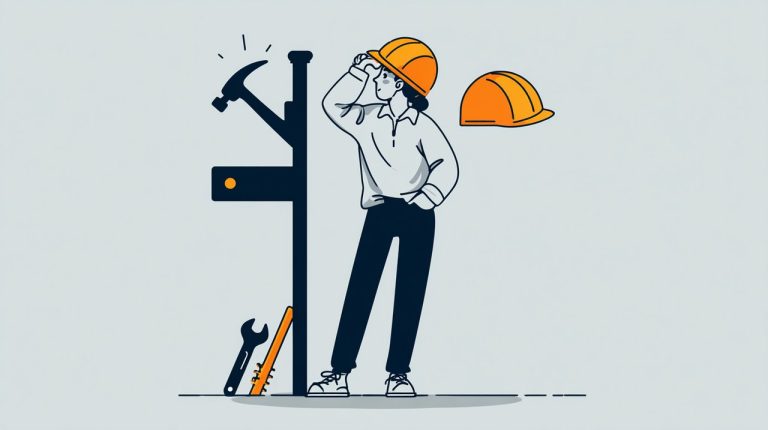I’ve seen it happen too many times. A homeowner, desperate for a new roof, picks the cheapest bid or the smoothest talker. Fast forward six months, and they’re left with a leaky ceiling, a moldy attic, and an empty bank account. It’s a gut-wrenching experience, and frankly, it’s preventable.
Your roof isn’t just shingles and wood; it’s the shield protecting everything you value inside your home. Yet, finding a dependable expert to fix or replace it often feels like navigating a dark alley blindfolded. But it doesn’t have to be that way. Consider this your flashlight, your map, and my personal hard-earned wisdom. I’m here to give you the clarity and the no-nonsense steps you need to get this right.
The True Cost of a Bad Roof: More Than Just Shingles
Choosing the right roofing contractor isn’t about picking a pretty color for your house. It’s about the very foundation of your home’s long-term health and value. A shoddy installation isn’t just an eyesore; it’s a ticking time bomb.
I once had a client who went with a ridiculously low bid. Within a year, a small drip in the corner of their master bedroom turned into a full-blown cascade during a storm, ruining antique furniture and leading to widespread mold in the walls. What started as a few hundred dollars saved on the roof ended up costing them tens of thousands in repairs, not to mention the emotional toll. That’s the ‘cascade of problems’ we talk about: persistent leaks, mold, compromised insulation, even structural decay. These aren’t just inconveniences; they’re financial black holes and health hazards.
On the flip side, a truly reliable contractor? They offer something priceless: peace of mind. They use quality materials, follow the rules, and deliver work that lasts. It means you can sleep soundly during a downpour, knowing your investment is safe and your family is protected. Trust me, the effort you put in now to find that reliable pro will save you a fortune in headaches and expenses down the line.
▸ Click to view the full infographic
Beyond the Hype: My Vetting Playbook for Contractors
Alright, so you understand why you can’t just pick a name out of a hat. But how do you actually find a contractor you can trust? It takes more than a quick Google search, believe me. You need a methodical, no-shortcuts approach to dig into their background and track record. This is where you separate the talkers from the doers.
Start with Your Inner Circle: The Power of a Handshake Recommendation
My first rule of thumb: start with who you know. Ask friends, family, or neighbors who’ve had roofing work done recently. A personal recommendation carries weight because it comes with direct, lived experience. It’s like getting a review from someone whose opinion you already trust.
A referral from a trusted source is often the most reliable starting point for any significant home project. I’ve seen good referrals save people years of grief and thousands of dollars.
Once you’ve exhausted your network, then hit the online review platforms. Look for contractors with a solid local presence and a history of consistent service. But here’s a critical warning: don’t get hung up on one or two bad reviews. Look for patterns. Are there recurring complaints about communication? Shoddy work? Disappearing acts? That’s your red flag. And always remember, some competitors will try to sabotage a good contractor with fake reviews, so read with a discerning eye.
No License? No Insurance? No Deal. Period.
This isn’t negotiable. If a contractor can’t or won’t show you their current license and insurance, you walk away. Fast. I don’t care how good their price is. I once saw a homeowner try to save a few bucks by hiring an uninsured crew. One of the guys fell off the roof and broke his leg, and guess who ended up on the hook for his medical bills? The homeowner. Don’t let that be you.
Every legitimate roofing contractor needs to be properly licensed by the state and local authorities. This confirms they meet professional standards and are legally allowed to work. And just as critical, verify their insurance coverage:
- General Liability Insurance: This is your shield. It protects you from damage to your property or injuries to third parties (like a neighbor’s car getting hit by falling debris) that happen during the project.
- Workers’ Compensation Insurance: This protects you from liability if a worker gets hurt on your property. Without it, you could be on the hook for their medical bills and lost wages.
And here’s another veteran tip: don’t just take a photocopy from the contractor. Ask them to have their insurance provider email the certificates directly to you. It’s the only way to be absolutely sure the coverage is current and legitimate. It’s like checking the spare tire before a long road trip – you hope you never need it, but if you do, it’s there.
Digging Deeper: What Past Clients Really Say
Once you’ve cleared the basic hurdles, it’s time to play detective. Dive deep into customer testimonials on independent review sites like Google, Yelp, or the Better Business Bureau. Pay close attention to recurring themes about communication, project timelines, and the actual quality of the work. A consistent stream of positive feedback usually means a contractor delivers what they promise.
Then, ask for their portfolio of completed projects. Any good contractor will be proud to show off their work. Even better, ask for references you can call directly. Speaking with past clients is invaluable. Ask them about the contractor’s strengths, sure, but more importantly, ask how they handled unforeseen challenges. Because believe me, something always comes up on a job. How they respond to problems tells you everything you need to know about their character and professionalism.
The Interview: Your Moment to Grill Them
Okay, you’ve got a shortlist of contenders. Now comes the real test: the interview. This isn’t just a casual chat; it’s your opportunity to assess their professionalism, their expertise, and whether they’re someone you can actually work with. Knowing the right questions to ask a roofing contractor will arm you with the information you need to make a truly informed decision. Don’t be shy; this is your money and your home on the line.
My Go-To Questions for Any Roofing Pro
I always come prepared with a core list of questions. These aren’t just formalities; they’re designed to uncover their experience, their process, and their commitment to you. Pay attention not just to *what* they say, but *how* they say it. Are they confident? Evasive? Do they listen?
- “How long have you been in business under your current name?” (Longevity under the same name often indicates stability.)
- “Do you use subcontractors, and if so, how do you vet them?” (This is a big one. You want to know who’s actually on your roof.)
- “What is your project management process from start to finish?” (A clear process shows organization, not chaos.)
- “Can you provide a detailed timeline for the project?” (Holds them accountable.)
- “What type of warranty do you offer on labor and materials?” (Your long-term protection.)
Their responses should be clear, confident, and consistent. Watch for vague answers or contractors who seem to brush off your concerns. A good contractor will be genuinely interested in understanding your specific needs, not just selling you a roof.
Decoding the Quote: What’s Really in the Price?
Never, ever accept a verbal quote. It’s worthless. You need a written, itemized proposal that breaks down every single cost. If they can’t give you that, they’re either hiding something or they don’t know their own business. Both are bad news.
A comprehensive quote should be a detailed blueprint of the job. It needs to include:
- Material specifications: The brand, type, color, and exact quantity of everything – shingles, underlayment, flashing. Don’t let them just say “shingles.”
- Labor costs: A clear breakdown of the work involved.
- Permit fees: Who is responsible for getting and paying for them? (It should be them.)
- Waste disposal: How will they handle the old roof and debris? (You don’t want a dumpster sitting in your driveway for weeks.)
- Payment schedule: Clear milestones for payments. Never pay it all upfront.
Get at least three detailed quotes. And be highly suspicious of any bid that’s significantly lower than the others. That’s usually a red flag indicating shortcuts in materials, labor, or even a lack of proper insurance. Remember the old saying: “You get what you pay for,” especially in home repairs. A reliable contractor will provide a transparent breakdown and patiently explain every line item. If they rush you, walk away.
The Contract: Your Ironclad Agreement
Before you sign anything, read that contract like your life depends on it. Because in a way, your home’s future and your bank account do. It needs to reflect every single thing you’ve discussed and agreed upon. Don’t assume anything. Assumptions are where homeowners get burned.
Make sure the contract includes:
- Project start and completion dates.
- A detailed scope of work.
- Payment terms and schedule.
- All material specifications.
- Warranty information (both manufacturer and labor).
- Provisions for change orders (because things change).
- Dispute resolution mechanisms (just in case).
If anything is unclear or seems off, demand clarification. And for larger projects, don’t hesitate to have a legal professional review it. I’ve seen clients lose thousands because they skimmed the fine print. This due diligence isn’t just about protecting your interests; it’s about ensuring the contractor is committed to what they promised.
The Finish Line: From Build to Beyond
So, you’ve picked your pro, and the contract is signed. The real work begins, and the contractor’s responsibility doesn’t end when the first shingle goes down. Effective communication throughout the project and solid after-sales support are the hallmarks of a truly reliable professional. This is where you see if they’re just good at sales, or actually good at the job.
Staying in the Loop: Communication is Key
Once work begins, keep that line of communication open. Establish one primary point of contact and agree on how often they’ll update you. Regular check-ins mean work stays on track and any issues get addressed fast. And here’s another golden rule: document everything significant. If you discuss a change, get it in writing – an email, a text, anything. I had a client once who verbally agreed to a material change, and when the bill came, the contractor denied it. A simple email could have saved them a nasty dispute.
The Final Walk-Through: Don’t Pay Until It’s Perfect
Before you hand over that final check, you conduct a thorough inspection. This is your last chance to ensure everything is done right. Walk around your home, check the roof, the gutters, the yard. Look for:
- Proper shingle alignment and secure fastening.
- Correct flashing around chimneys and vents (critical for preventing leaks).
- Clean gutters and downspouts.
- Absolutely no construction debris left behind.
If you find anything wrong, anything at all, bring it up immediately. And here’s my firmest advice: withhold final payment until every single agreed-upon item is completed to your satisfaction, and the clean-up is immaculate. This is your leverage, and it incentivizes the contractor to finish strong and right. Once the money is gone, so is your power.
Your Long-Term Shield: Warranties and Maintenance
A reliable roofing contractor will back their work with a comprehensive warranty covering both their workmanship and the materials. Understand those terms inside out: what’s covered, for how long, and what’s the process if you need to make a claim. Treat these warranty documents like gold; keep them in a safe, accessible place.
Beyond the warranty, ask about recommended maintenance. A good contractor isn’t just selling you a roof; they’re acting as a partner in its long-term health. Understanding simple care practices can significantly extend your roof’s lifespan and prevent future issues. It’s like having a mechanic tell you how to keep your car running smoothly – it’s about protecting your investment.
Finding a reliable roofing contractor is more than just a transaction; it’s an investment in your home’s future and, more importantly, your peace of mind. By diligently following these steps, you empower yourself to make smart decisions and secure a lasting, quality roof. This guide isn’t just advice; it’s the distilled wisdom from years of dealing with good, bad, and ugly home projects. Use it, and you’ll ensure your home remains that sturdy, unbreachable fortress, never falling victim to the kind of preventable disaster I saw so many times. Your home deserves that protection, and so do you.
💡 Frequently Asked Questions
Choosing a reliable roofing contractor is crucial for the long-term structural integrity and value of your home. A subpar installation can lead to costly issues like leaks, mold, and structural damage, while a reliable contractor ensures quality materials, safety standards, and durable craftsmanship, safeguarding your investment and providing peace of mind.
You should begin by seeking personal recommendations and researching online review platforms. Crucially, verify their state and local licenses and ensure they hold General Liability Insurance and Workers' Compensation Insurance by requesting current certificates directly from their insurance provider. Additionally, review customer testimonials and ask for a portfolio of completed projects and references.
A detailed roofing quote should be written and itemized, clearly breaking down all costs. It must include material specifications (brand, type, quantity), labor costs, permit fees (identifying who is responsible), waste disposal methods, and a clear payment schedule with milestones.
During the project, maintain open communication with the contractor and document significant conversations. After completion, conduct a thorough inspection of the roof, gutters, and surrounding areas for proper shingle alignment, flashing, and cleanliness. Withhold final payment until all work is completed to your satisfaction and clean-up is done. Also, understand the terms of the workmanship and material warranties provided.






